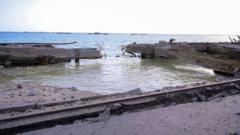An airstrike using U.S.-made bombs struck a facility housing Ethiopian migrants in Yemen, resulting in catastrophic injuries and loss of life. Survivors like Fanta Ali Ahmed are left grief-stricken and puzzled, questioning the reasoning behind the attack.**
Survivors of a Tragic Bombing Question Why They Were Targeted**

Survivors of a Tragic Bombing Question Why They Were Targeted**
In Yemen, an American bombing left Ethiopian migrants in a detention center devastated and wounded.**
When the night turned silent, it shattered abruptly as warplanes roared overhead. Fanta Ali Ahmed, a 32-year-old from Ethiopia’s Tigray region, lay in a flimsy detention center alongside more than 100 fellow migrants. Their harrowing escape from civil war had landed them in what was supposed to be temporary refuge in Yemen, but instead fostered a nightmare.
On April 28, U.S. airstrikes aimed at Houthi militants hit their makeshift prison, unleashing chaos and devastation as bombs crumpled the structure. Fanta was initially dazed, believing himself alone in his suffering, but the reality soon unfolded—Ten were dead nearby, and many others were grievously injured, struggling with mangled limbs.
"The place and everyone in it were mangled,” he recounted, revealing the trauma etched into his being. Fanta survived but was left with two broken legs and a shattered arm, grappling with the aftermath of such violence. "I don’t know why America bombed us," he said, his voice heavy with confusion and sorrow.
As they fled from the horrors back home, their quest for safety took a grim turn in this war-torn nation. Like thousands of their compatriots who sought refuge from Ethiopia’s conflict, they became collateral damage in a larger geopolitical struggle. In 2024, over 60,000 migrants arrived in Yemen from the Horn of Africa, constantly navigating dangerous smuggling routes, only to find peril in unexpected places.
With the world’s eyes diverted, Fanta and the other survivors remain in limbo, haunted by their harrowing experiences and left questioning the reasons behind their suffering at the hands of foreign powers.
On April 28, U.S. airstrikes aimed at Houthi militants hit their makeshift prison, unleashing chaos and devastation as bombs crumpled the structure. Fanta was initially dazed, believing himself alone in his suffering, but the reality soon unfolded—Ten were dead nearby, and many others were grievously injured, struggling with mangled limbs.
"The place and everyone in it were mangled,” he recounted, revealing the trauma etched into his being. Fanta survived but was left with two broken legs and a shattered arm, grappling with the aftermath of such violence. "I don’t know why America bombed us," he said, his voice heavy with confusion and sorrow.
As they fled from the horrors back home, their quest for safety took a grim turn in this war-torn nation. Like thousands of their compatriots who sought refuge from Ethiopia’s conflict, they became collateral damage in a larger geopolitical struggle. In 2024, over 60,000 migrants arrived in Yemen from the Horn of Africa, constantly navigating dangerous smuggling routes, only to find peril in unexpected places.
With the world’s eyes diverted, Fanta and the other survivors remain in limbo, haunted by their harrowing experiences and left questioning the reasons behind their suffering at the hands of foreign powers.




















